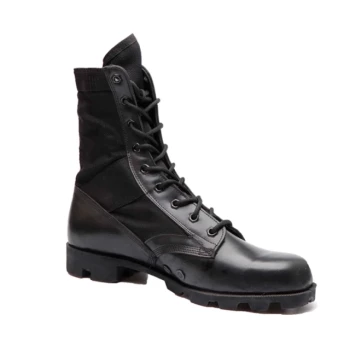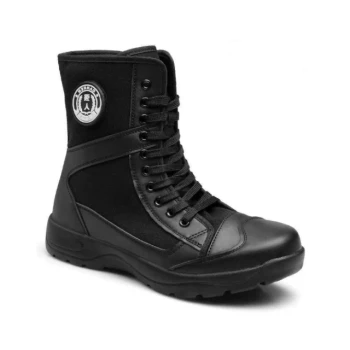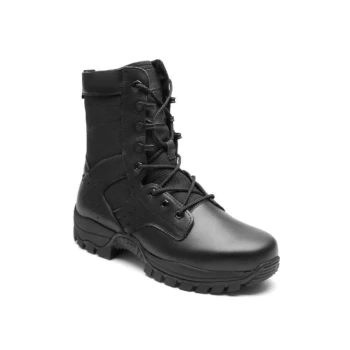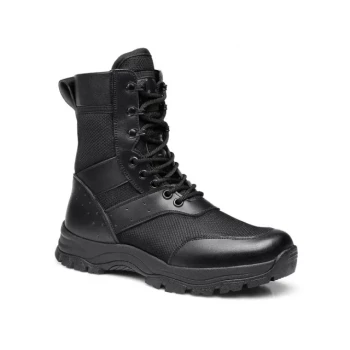To ensure your footwear choices are environmentally sound, you must strictly avoid Wellington boots manufactured with Polyvinyl Chloride (PVC), nitrosamines, and chlorinated paraffins. These materials are chemically hazardous, fail to degrade in landfills, and actively introduce toxins into the ecosystem.
True sustainability in footwear is not just about durability; it is about the entire lifecycle of the product. Avoiding synthetic plastics and toxic additives is the single most effective way to prevent long-term soil contamination and bioaccumulation in the food chain.
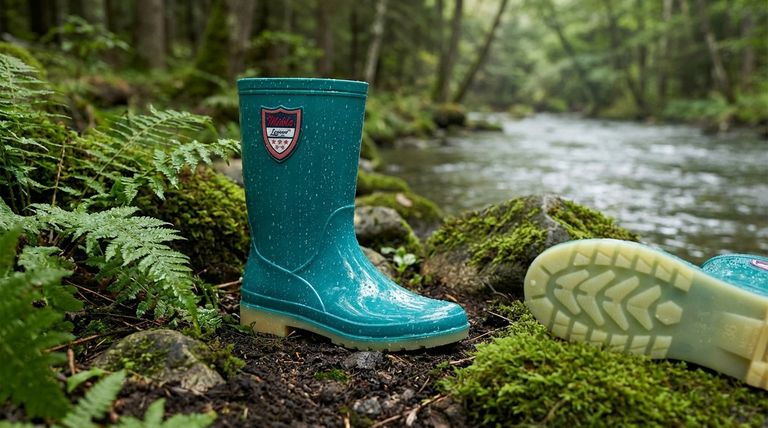
The Materials You Must Reject
To understand the environmental impact of rain boots, you must look beyond the waterproof label and examine the chemical composition. The following three materials represent the most significant threats to sustainability.
The Environmental Persistence of PVC
Polyvinyl Chloride (PVC) is a synthetic plastic widely used for its low cost and waterproofing capabilities.
However, standard PVC creates a permanent waste problem because it does not biodegrade.
Instead of breaking down harmlessly, it persists in landfills for centuries, eventually releasing toxic chemicals into the soil and groundwater.
The Carcinogenic Risk of Nitrosamines
Nitrosamines are chemical byproducts often generated during the rubber manufacturing process.
These compounds are recognized carcinogens, posing direct health risks to humans during production and use.
Furthermore, they remain harmful to the environment long after the boots have been discarded.
The Bioaccumulation of Chlorinated Paraffins
Chlorinated paraffins are frequently added to plastics and rubbers to increase flexibility or flame resistance.
These act as persistent environmental pollutants that resist natural degradation.
The danger lies in bioaccumulation: these chemicals build up in the food chain, impacting wildlife and ecosystems at a systemic level.
Understanding the Trade-offs
While avoiding the materials listed above is critical, selecting a replacement involves weighing different factors. Not all "green" alternatives function the same way.
Natural vs. Synthetic Solutions
Natural Rubber is the gold standard for sustainability because it is renewable, recyclable, and fully biodegradable.
However, manufacturing with natural materials can sometimes be more resource-intensive or expensive than mass-produced synthetics.
The Nuance of Biodegradable PVC
Biodegradable PVC is an alternative mentioned in industry references.
It is designed to break down when exposed to the elements, addressing the landfill longevity issue of standard PVC.
However, users should recognize that this is still a synthetic plastic solution, distinct from the renewable origin of natural rubber.
Making the Right Choice for Your Goal
When selecting your next pair of Wellington boots, filter your options based on your specific environmental priorities.
- If your primary focus is complete biodegradability: Prioritize Natural Rubber, as it is a renewable resource that returns to the earth without leaving synthetic microplastics.
- If your primary focus is minimizing manufacturing impact: Choose Recycled Rubber, which reduces the energy and raw materials required for production.
- If your primary focus is avoiding toxicity: Verify the product is certified free of Nitrosamines and Chlorinated Paraffins to ensure safety for both you and the food chain.
Your choice of materials today dictates the environmental legacy your gear leaves behind tomorrow.
Summary Table:
| Material to Avoid | Key Environmental Hazard |
|---|---|
| Polyvinyl Chloride (PVC) | Non-biodegradable; persists in landfills for centuries, leaching toxins. |
| Nitrosamines | Carcinogenic; poses health risks and long-term environmental contamination. |
| Chlorinated Paraffins | Bioaccumulates in the food chain; resists degradation, harming ecosystems. |
Ready to make a sustainable choice for your footwear line? As a large-scale manufacturer, 3515 produces a comprehensive range of eco-conscious Wellington boots for distributors, brand owners, and bulk clients. We prioritize sustainable materials like natural and recycled rubber, ensuring your products are safe, durable, and environmentally responsible.
Let's build a greener future together—contact our team today to discuss your production needs!
Visual Guide
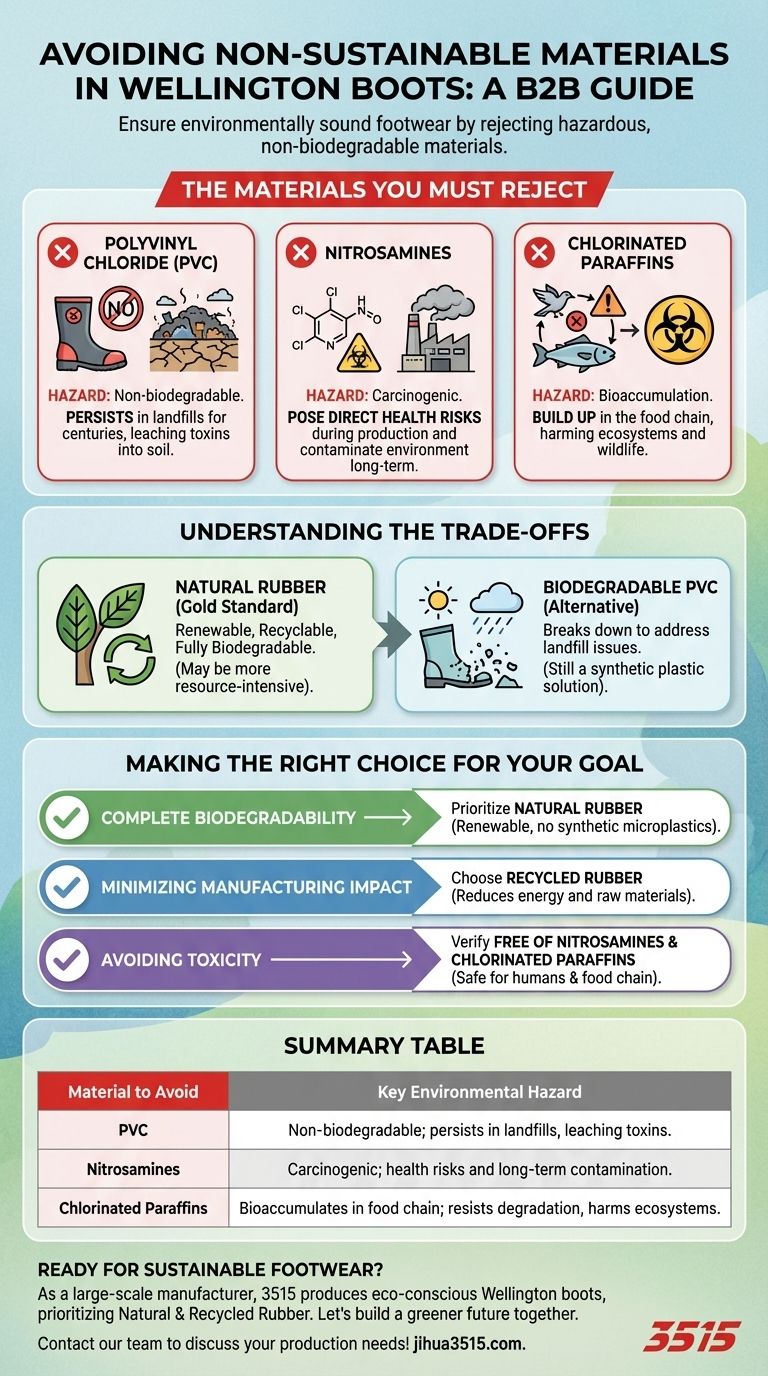
Related Products
- Factory Direct Wholesale Rain Boots Durable Waterproof & Fully Customizable
- Wholesale Waterproof Tactical Boots Custom Suede & High-Traction Soles
- Durable Military Combat Boots with Water Drainage for Wholesale & OEM
- Durable High-Ankle Tactical Boots Wholesale Manufacturer for Custom & Bulk Orders
- Durable High-Ankle Tactical Boots for Wholesale & Custom Manufacturing
People Also Ask
- Are Wellington boots typically oversized? The Truth Behind the Roomy Fit
- Can wellies be washed in a washing machine? Avoid Costly Damage to Boots & Machine
- What are the advantages of PVC wellington boots? Discover the Perfect Blend of Affordability & Waterproofing
- How does the lightweight nature of PVC boots benefit workers? Reduce Fatigue & Prevent Injury
- What variety of rubber boots is available? From Rain to Safety and Medical Solutions
- How can children's feet be measured for Wellington boots? A Step-by-Step Guide for the Perfect Fit
- What are the typical uses for PVC rain boots? An Economical Choice for Light-Duty Waterproofing
- What is the proper way to dry waterproof shoes? Avoid Damage and Extend Their Lifespan


